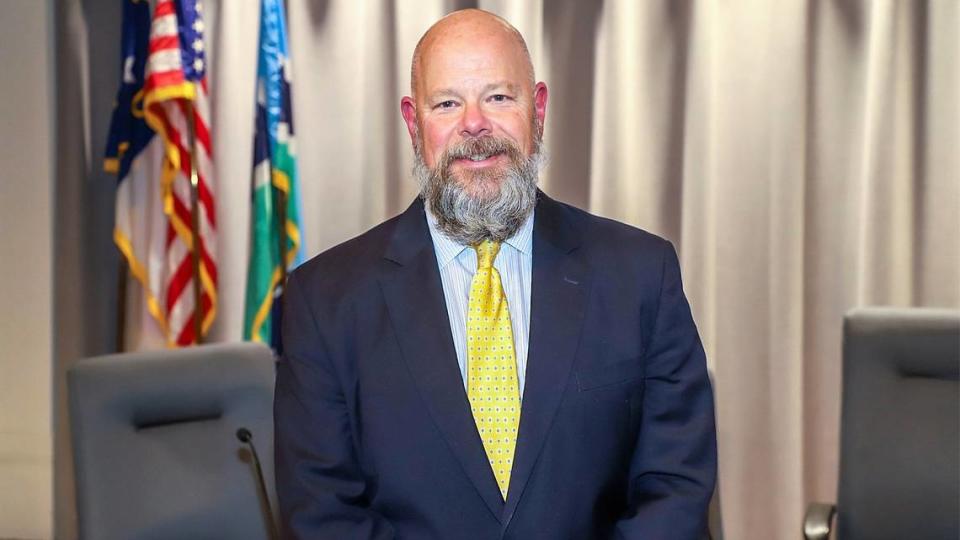Chapel Hill homeowners face tax hike to pay for backlog of needs, boost salaries
Chapel Hill homeowners could pay higher property taxes for a proposed $143.7 million town budget that includes more money for staff pay, town vehicles and parks.
The draft 2023-24 budget is an 11% increase over last year’s $129.3 million budget and includes a 5% pay raise for town employees.
Interim Town Manager Chris Blue recommended Wednesday that the Town Council implement a roughly 10% tax hike to help pay for the budget. The staff pay increase would be based on what the market pays for a particular job, not base pay, he said.
“We have not had a significant tax increase in years, the cost of doing business has gone up, and you have some big, bold goals,” Blue said. “I want to remind you that our tax rate, even with the increase I’m proposing, still places us in the middle of the pack in our region, including our neighbors next door in Carrboro.”
The proposed budget includes an $84.5 million daily operations budget, a $32.1 million transit fund budget, and additional money for capital improvements, such as construction and big-ticket purchases.
What will budget pay for?
Blue highlighted a few ways the extra tax dollars could be used each year, including:
▪ $250,000 for small capital projects like replacing roofs at the Chapel Hill Community Center and Chapel Hill Post Office on East Franklin Street.
▪ $750,000 for vehicles, including four police cars, a solid waste front loader, and three parks and public works trucks next year.
▪ $971,000 for parks projects, including a new master plan, replacement tennis courts, basketball goals and playgrounds
▪ $250,000 for fire equipment, rescue tools and an all-terrain vehicle
▪ $500,000 for a greenways planning manager and design work for the Campus to Campus Greenway

The proposed tax rate increase — from 52.2 cents to 57.2 cents per $100 in assessed property value, a nearly 10% hike — would add $200 to the bill for a home valued at $400,000.
Chapel Hill residents also pay county property taxes and a special tax if they live in the Chapel Hill-Carrboro City Schools district. County Manager Bonnie Hammersley has recommended a 0.46-cent county tax rate increase for next year, and a 1.5-cent tax rate increase for the city schools district. Those would add another $78.40 increase to the total tax bill for a $400,000 home.
Mayor Pam Hemminger asked Blue and town staff to bring back other options for the proposed tax increase, including the possibility of deferring new hires. Otherwise, the tax increase will be a “huge jump” for businesses and people living on limited incomes, she said.
“We need all these things, guaranteed,” Hemminger said. “I just want to be able to have that balance with the community, because, yes, the town of Chapel Hill tax rate is middle of the pack, but when you combine it with the Orange County tax and the school district tax, which is going up, it’s a big chunk for folks.”
Sue Hunter, chair of the town’s Housing Advisory Board, asked the council to also consider joining the county in its new tax assistance program for homeowners or starting its own program, similar to programs in Durham and other cities.
Otherwise, continuing property tax increases could force more homeowners out of their homes, leading to gentrification and less affordable communities, Hunter said.
The council will hold a budget public hearing on May 24 at Chapel Hill Town Hall, and could adopt the budget on June 14. The council will hold work sessions to discuss its options May 17 and May 31.
Backlog of expenses
Blue warned the council in February that the town faced a $60 million backlog for over a decade of delayed maintenance, an aging vehicle fleet, and growing inflation and personnel costs. The town, during the pandemic, delayed addressing the backlog to limit the effect on residents and businesses that were already reeling from the economic shutdown.
This is the first year of a five-year budget strategy meant to give the council a roadmap for taking care of the backlog and advancing plans for the town’s future.
The backlog of needs includes:
▪ $1 million for employee recruitment and retention and $3.2 million to add new positions
▪ $6.8 million for core services, including technology and program needs
▪ $10.1 million for building maintenance and repairs, identified in a 2017 town study. The town started to address the needs in 2018, but COVID delayed the work. Pandemic money met some needs, but that is running out.
▪ $9.3 million to replace and maintain town vehicles. Roughly 53% of those 400 vehicles, plus fire trucks and buses, are either due or past due for replacement, staff has said.
▪ $30 million for affordable housing.

Tax rate increases have been limited
Council members have only voted to raise taxes in five of the last 14 years, for a total cumulative tax rate increase of 6.68 cents since 2009, or less than 1% each year.
Blue reiterated the need for a tax increase in a budget message last week to the council. The proposed increases are “not excessive,” he said.
“For too many years, we have maintained funding levels while costs have risen and we are unable to continue operating this way. It is time to acknowledge that, in order to address the significant backlog of unaddressed needs, we need this increase,” he said.
While sales tax revenues and property values have grown in the last few years, the town has largely relied on its fund balance — undesignated money from the previous year — to cover shortfalls.
There are no luxuries in the town’s budget to cut, Blue said, and the backlog is keeping it from giving employees the resources to do their jobs and paying them competitive wages.
At least nine of the town’s 16 garbage trucks and multiple fire trucks have been down for repairs in the last year, 60 of 80 police vehicles have come due for replacement, and three of the town’s five fire stations have been assessed as no longer meeting firefighting needs.
Staff burnout and turnover also has been high, with employees leaving for better pay and more affordable homes in other communities, staff has said.
Other budget fund highlights
▪ The proposed budget includes money to pay an incentive for employees with dual language skills and for 11 full-time positions, including three firefighters, a special projects planning technician, commercial plans reviewer, crisis counselor and municipal arborist.
▪ $32.1 million for the transit fund, which is a 2.2% increase. The town’s share is roughly $6.5 million. UNC, Carrboro, and state and local money also pays for Chapel Hill Transit. Town staff noted that more local funding will be needed once pandemic relief money is spent.
▪ $12.7 million to pay toward the town’s debts

